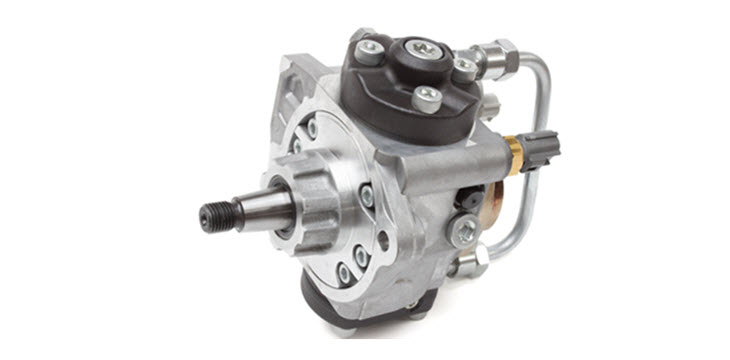Let’s discuss how to know if the vehicle problems you are experiencing are caused by the failure of the high-pressure fuel pump. Symptoms of a high-pressure fuel pump failure are:
- Delayed start of the engine
- Hesitation or sputtering in acceleration between 2000 RPM to 4000 RPM
- High engine temperatures
- Vehicle stalling due to exertion or temperature
- Fuel pressure gauge reading low measurements
- Poor gas mileage
What causes a high-pressure fuel pump failure?
The purpose of the high-pressure fuel pump, in combination with the low-pressure fuel pump, is to provide gas to the vehicle’s engine from the tank. A failure of high-pressure fuel pump can have significant impacts on your vehicle’s performance. Failure of the high-pressure fuel pump system translates to the following:
- The fuel pump is struggling to supply a consistent stream of fuel to the engine.
- The condition of the fuel pump is declining, negatively impacting its ability to supply fuel at the proper pressure.
- The condition of the fuel pump motor is creating resistance in standard functions.
- The fuel pump’s relief valve is failing to close, supplying more fuel than necessary, and reducing the vehicle’s overall fuel efficiency.
These conditions, and the resulting symptoms listed above, will ultimately result in your vehicle failing to operate or repeatedly stalling.
Inconsistent Fuel Supply to Engine
When the engine is not receiving enough fuel from the fuel pump system, or it is receiving fuel at the incorrect pressure, it cannot maintain engine combustion. This ultimately leads to engine failure: stalling or not starting at all. This can be a sign of damage to the fuel pump, aging of fuel pump, or even clogging of the mechanism. If you are not alerted to the problem by the listed symptoms first, your check engine light will power on and may be indicative of the described conditions.
Deteriorating Condition of Fuel Pump
The age of your fuel pump can ultimately manifest in any of the symptoms listed here, but one of the telltale signs of this is similar to sputtering in acceleration. However, instead of hesitation, the vehicle will surge suddenly, as if the gas pedal were pressed. This happens because, as the fuel pump system ages, different parts may be in better condition than others perform at different rates. While some parts are functioning properly and others are not, inconsistent engine pressures can result in sudden surges in speed while driving.
Open Fuel Pump Relief Valve
The relief valve is intended to play a part in regulating fuel pressure by closing and opening when appropriate. A failure of this relief valve, i.e. valve remaining open, will supply excessive amounts of fuel to the engine, damaging fuel efficiency and lowering pressure levels of the fuel pump system.
How to Avoid This
The high-pressure fuel pump is expected to last for about 10 years or 120,000 miles. Unfortunately, this is a problem that is inevitable over time. Still, there are a few things you can control that will extend the life of the high-pressure fuel pump:
Get regular oil changes
Many people tend to put off oil changes for as long as they can, since symptoms are not immediately observable. Yet, a lack of proper oil changes will ultimately result in degradation of your fuel pump. No lubrication from appropriate oil levels causes friction in key mechanisms, damaging the fuel pump and necessitating repair. A reduction in lubrication from the oil will also result in rising heat levels, a symptom that can lead to resistance of the fuel pump motor and ultimately, failure of the system.
Avoid running your fuel tank too low
Another common behavior that can cause permanent damage to the fuel pump is running the fuel tank low. Although it may seem like a minor maintenance concern, not enough fuel in the tank will expose your fuel pump to excessive heat and damage its functionality. Additionally, the fuel’s weight is an important factor in the fuel system’s capability to move the fuel from gas tank to engine, so, not enough fuel will impair this functionality.
Pay attention to fuel quality
Yes, the rumors are true. Your choice of fuel does affect the life of your vehicle and key mechanisms. Research has determined that “top tier” gas with detergent additives are best for your BMW‘s engine, helping it to not only run smoothly but to keep the engine clean as well.
Visit Das European Autohaus for Immediate BMW Service
If you are in the range in which  your fuel pump is recommended for replacement, 10-year-old-vehicle or 120,000 miles, or you have observed any of the above symptoms, contact your trusted local mechanic at Das European Autohaus in Spring, Texas. Our expertise lies in European vehicles such as your BMW. Our expert staff cares about top vehicle performance as well as the safety of our customers. If your vehicle is displaying signs of failure, contact our professional mechanics immediately. Das European Autohaus will diagnose the problem and the cause. We will provide high-quality service to ensure proper functionality and a long life for your BMW.
your fuel pump is recommended for replacement, 10-year-old-vehicle or 120,000 miles, or you have observed any of the above symptoms, contact your trusted local mechanic at Das European Autohaus in Spring, Texas. Our expertise lies in European vehicles such as your BMW. Our expert staff cares about top vehicle performance as well as the safety of our customers. If your vehicle is displaying signs of failure, contact our professional mechanics immediately. Das European Autohaus will diagnose the problem and the cause. We will provide high-quality service to ensure proper functionality and a long life for your BMW.








